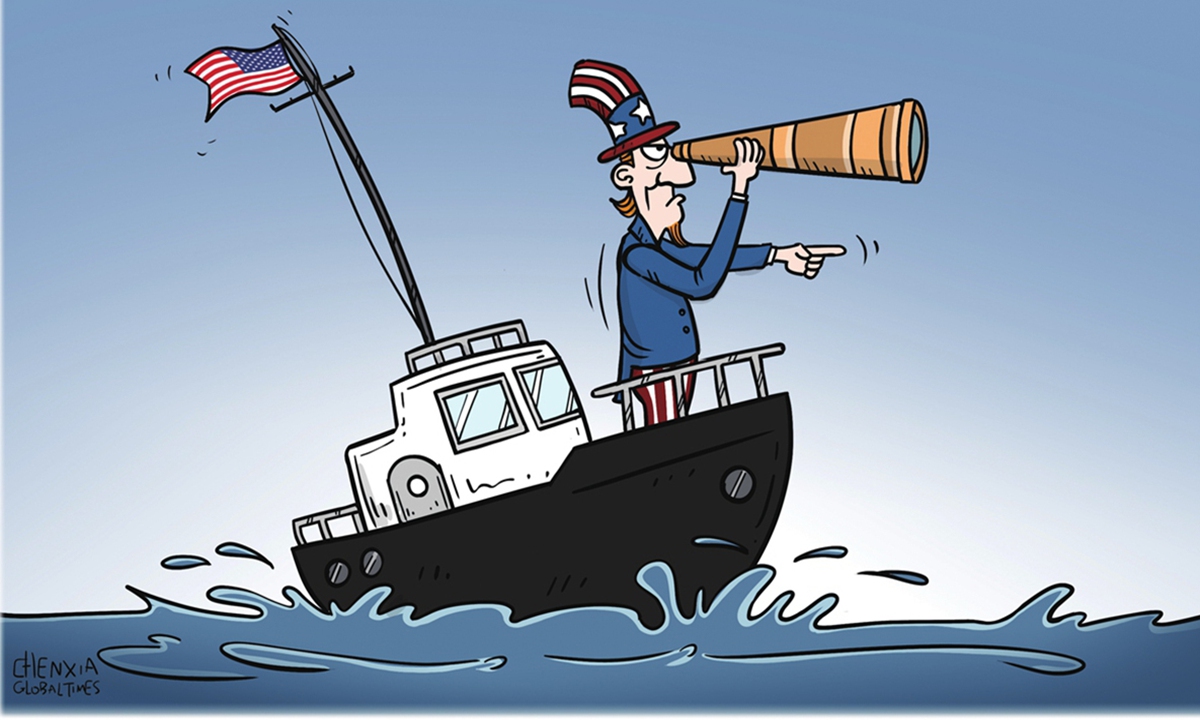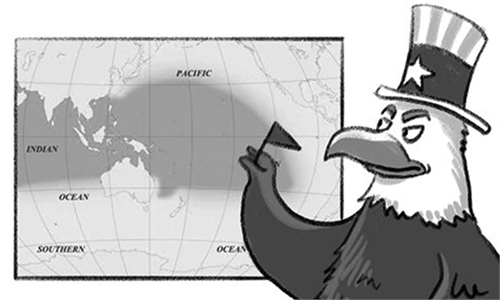Squad another example of Washington rallying allies to undermine peace in Asia-Pacific

US Asia-Pacific Illustration: Chen Xia/GT
Recently, there have been heated discussions over the strengthened alliance between the US, Australia, Philippines and Japan, also known as the "Squad." The four countries held their first joint naval exercises in the South China Sea on April 7. From April 22 to May 10, the navies of the Philippines, the US, Australia and France participated in the 2024 Balikatan or "Shoulder-to-Shoulder" joint military exercise. During this period, the defense ministers of the US, Japan, Australia and the Philippines held their second meeting in Hawaii on May 2, establishing a new four-party security mechanism known as "Squad." The defense ministers of the four countries held talks during the Shangri-La Dialogue in June 2023.
According to a joint readout released by the US Department of Defense on May 3, Squad aims to strengthen defense cooperation among the four countries to counterbalance China in the South China Sea and East China Sea. It is evident that this is another "mini-lateral" security cooperation mechanism promoted by the US in the Asia-Pacific region, following Quad and AUKUS, with a clear intention to target China.
These three mechanisms overlap in terms of function and coverage area, all focusing on the Asia-Pacific region with the South China Sea as the core area, emphasizing security cooperation and countering China. However, there are also significant differences among them. AUKUS aims to strengthen Australia's defense capabilities through security cooperation with the US and the UK. Quad aims to enhance security cooperation among the US, Japan, India and Australia in a broader sense, while Squad aims to strengthen the defense capabilities of the Philippines through security cooperation with the US, Japan and Australia.
Squad is closest to Quad in terms of form, but there are also significant differences between the two. On the one hand, Quad initially focused on non-traditional security and disaster relief, later emphasizing maritime security cooperation. Its functions cover both traditional and non-traditional security issues, with a primary focus on non-traditional security issues. In comparison, Squad places more emphasis on traditional security issues such as military and defense, especially maritime security cooperation. Squad can be understood as a quadrilateral cooperation mechanism in the traditional security field.
On the other hand, compared to Quad, Squad replaces India with the Philippines as a member. The main reason may be that India is concerned that if it puts too much focus on cooperation in the traditional security field with those countries, it may provoke China's dissatisfaction. On the contrary, Philippine President Ferdinand Marcos Jr is more willing to cooperate with the US in provoking China in the South China Sea, which aligns more with the US strategy of advancing its Indo-Pacific Strategy.
As indicated in the joint readout of the defense ministers' meeting, Squad focuses on defense cooperation as the main means and explicitly targets China. Squad, led by the US, inevitably serves Washington's interests. Viewing China as its primary strategic competitor, the US has been using its allies in Asia-Pacific as tools for balancing China. US officials have stated that Squad will conduct more joint patrols in the coming months and years to ensure that defense capabilities among their militaries are increasingly interoperable. This implies that Squad's actions in the areas around China are likely to become more provocative, increasing the risk of military friction or conflict between the four countries and China and seriously undermining regional peace and stability.
In terms of geographical location, the distance between the Philippines and China is very close, and previous Philippine presidents have mostly chosen to implement a "balanced diplomacy" between China and the US. The Marcos Jr administration hopes to attract investment from China and seek security protection from the US. However, under pressure from both domestic and international factors, it insists on maintaining the so-called Philippine interests in the South China Sea at the expense of damaging China's interests. It continuously provokes China in the South China Sea and cooperates with US military actions.
The Philippines is the weakest country among the US Asia-Pacific treaty allies, and cooperating with the US against China means actively involving itself in the strategic game between China and the US. This is not a wise choice for any country, especially for the Philippines, which does not have strong military capabilities. China has always valued friendship with neighboring countries and pursued a policy of good-neighborly relations, but it will not sacrifice national interests for the sake of friendship and will resolutely defend its core national interests. The actions of the US have put its Asia-Pacific allies in a dangerous situation, and Manila's actions pose a threat to its national security and regional stability.
The author is an associate research fellow with the National Institute of International Strategy at the Chinese Academy of Social Sciences. opinion@globaltimes.com.cn

